The Tales of Josh Deane: The Pioneer Storyteller (and Barbecuer) of Meeteetse
By Alexandra Deselms, Interim Director and Director of Collections
Of all the pioneers introduced in the blog this summer, there has probably been the most written by this pioneer, John W. “Josh” Deane. This is in large part, of course, because his memoirs were transcribed and published in newspaper accounts in the 1930s and as its own book in 1996. In the other posts on Arland, Ashworth, Corbett, and McDonald, we’ve endeavored to present as full a picture of that pioneer’s life as possible. Here, we will briefly cover the full story (including his three divorces and four wives!) but focus on retelling some of his best tall tales and stories about the postal system, early pioneers, and life in the Bighorn Basin. For more information, we invite you to come research at the museum or purchase Josh’s book in our bookstore.
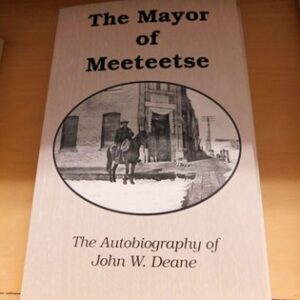
Cover of Josh’s memoirs in the bookstore
Josh was born in Phoenixville, Chester County, Pennsylvania on February 28, 1856 to immigrant Isaac Deane from Devonshire, England and mother Mary Jane Clift, who had been married (according to Josh’s memoir) at the age of 14. Isaac was a gardener and the kids were needed to assist their parents; the 1860 census has Isaac (30), Mary Jane (20), William John (John W – 4), and brother Isaac (1) living with the Clift family as laborers (likely the in-laws). The 1870 census is actually missing Josh but adds more children to Isaac (41) and Mary’s (30) family: Hanna (12), Isaac W (10), Elizabeth (8), Sarah (5), Thomas (3), and Clift less than a year). We have not been able to find Josh in any 1880 census so far but his family was still in Chester County, Pennsylvania: Isaac (60), Mary (40), Issac W (20), Sarah (15), Clift C (11), Philip (7), and Charity (4).
Josh estimates in his memoirs that he went to school for a total of only one year, being in and out of school to help his parents. He remembers that geography fascinated him since “It read like romance. It brought visions of travel, adventure, and wealth gathered in strange lands…obtained to the accompaniment of stirring adventures with the Indians and thrilling buffalo hunts.” He imagined himself as a hero in these adventures, and with his friend Eddie Post, he ran away from home at the age of 15 (circa 1871-72) to see the West, “borrowing” grocery money from his parents (which he repaid after the two boys received a reward for assisting in convicting a couple of bank robbers in Indianapolis). The two boys were separated in Kansas City, Missouri after finding different jobs.
After a series of small jobs in Kansas City, Josh was sent to Dallas as part of his greenhouse job but after the flowers were ruined before they could be delivered, he stayed to work at the railroad as a water boy. He enjoyed seeing the Mexican cattle ranches and was eventually able to find work with a Mr. Flood herding cattle north. These were not the placid beef or dairy cows of today — these were wild cattle, gathered in from the “jungles” of southwestern Texas. This was Josh’s first taste of the real, wild west, of men who’d learned ruthlessness in the Civil War and left for more wild regions. “The West was losing a little of its glamour and assuming a somber and somewhat menacing aspect. For the first time, I wondered if I might become one of its victims, instead of finding it the gateway to adventure and wealth.”
Josh stayed a year with the company herding cattle north to Nebraska and the Rosebud agency before heading to Wyoming.
This equipment I deemed sufficient to carry me to the region of gold and buffaloes, of which I still dreamed, though with visions slightly less gorgeous than of old. The only flaw in my happiness was the absence of [my friend] Eddie; we had dreamed our dreams of the West together, and now I must live them alone. I had waited for him as long as there seemed any hope of finding him….My plans and destination were vague, but I had heard that some prospectors were striking it rich in the Wyoming region, around the Atlantic, and had it in my mind to try my luck there.
He came across a band of Native Americans and stopped to observe them. “I was greatly interested; I had not yet seen enough of Indian life to get my romantic eastern notions out of my head.” An older man invited him to eat and stay, which he did, but the next morning, Josh’s pony was gone, either run off or stolen (as Josh suspected). With no transportation, he was forced to stay with the camp for several months while they traveled west until he “escaped” upon finding a trapper near South Pass. He had, at least, fulfilled one goal – to see and eat buffalo.
The trapper helped him to Atlantic City on Rock Creek (around 1872-73) and advised Josh that prospecting was unlikely to be profitable so he should look for freighting (“whacking bulls”) or carrying government dispatches. Josh ended up freighting for a while after serving as a general chore boy for the officers and wives of Fort Washakie (formerly Camp Brown); he met Chief Washakie in 1875.
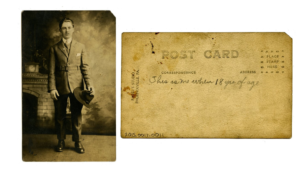
Picture postcard using a photograph of Josh c. 1874 at the age of 18 (according to the back); the postcard is from a studio in Phoenixville, PA, Museum Collections 2015.0017.0011. The photograph could match the story in Josh’s memoir about buying a khaki suit on credit because the store owner’s siblings lived in a town near Josh’s back in Pennsylvania.
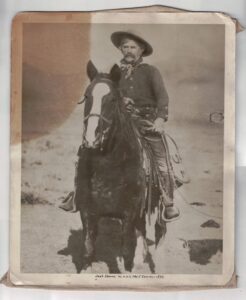
Photograph c. 1876 when Josh was a mail carrier, 2015.0017.0024
In 1876, Josh took the opportunity to become a government dispatch carrier, which paid more than freighting. He was sent to the Custer and Reno camp with a Shoshone guide, seeing the Big Horn Basin he would later settle in for the first time. Upon arriving near Reno Creek at the military camp, he was one of the first outsiders to see and hear about the Battle of Little Big Horn (also known as Custer’s Last Stand). On the return to Fort Washakie, he was photographed by a French trapper with the dispatch pouch carrying the first word of Custer to the outside world; Josh claims it was one of his most cherished possessions, but unfortunately, we do not know where it ended up.
In 1877, he helped equip General Sherman’s trip to Yellowstone and explored with the party. A year later, he took several mail trips into the Yellowstone country with government surveyors. However, Josh also says that after a year carrying dispatches (which would be about 1877), he quit and went to Green River, Wyoming, where he gambled, went broke, and was sick for seven weeks in the hospital, whereupon he had trouble paying his bill. Fortunately, his friend paid the bill and got Josh a job in the round house of the Union Pacific Railroad. After six months, he was able to repay his friend and then it was back to Fort Washakie. In another chapter of his memoir, he confuses matters further by describing how in the late 1870s, he went back to Nebraska, where he worked at Buffalo Bill Cody’s North Platte ranch for long enough that Buffalo Bill conferred “the title of Colonel upon me. I have long been known as Col. Deane to many people, who supposed they were using a title I received in an Indian campaign. Although my claim to the rank might not hold in court, I have always felt that it was no less an honor to be named colonel by the great scout than to have received the dignity in the ordinary way.” He does, however, claim that this was between jobs.
In Josh’s absence, the Bighorn Basin had begun to get settlers. Josh established a private mail route paid for by subscriptions from settlers between J.K. Moore’s store at Fort Washakie and Stillwater, Montana, which Josh ran from about 1877 until 1881 (he was later a government mail carrier until about 1884). He met Otto Franc during this time, who later became Josh’s “closest friend.” He was also sick again during this time for nine months from mountain fever and pneumonia.
Around 1884, Josh took up a homestead and since it was a small claim, he had extra time so he worked off and on for Otto Franc for seven years. He sometimes went east to Chicago with Otto’s cattle and during one trip decided he needed to get a wife; he got the name of a girl in Chicago and began writing letters to her. He and Emma Sheppard were married in September (according to his memoirs) or October (according to the Illinois marriage license) 1885. They apparently had a son together in September 1886 in Illinois, George Edward Deane. They divorced in September 1887.
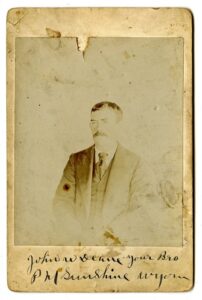
Photograph c. 1886 – 1915 when Josh was Post Master in Sunshine
In 1886, Josh related that he was asked by his neighbors to put in a bid for a post office at Sunshine since his ranch was the central point of the area; it was accepted and the post office was started, even though he was not officially appointed as postmaster until 1890. He proved his homestead application in 1889. He filed a land patent in 1895.
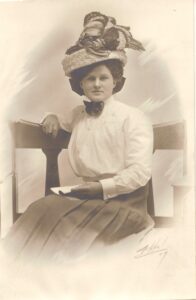
Portrait of Lulu Henderson.
He married Matilda (Tillie) Korcek Henderson in Red Lodge, Montana in November 1899. She and her eight-year-old daughter Lulu Henderson are with Josh in the 1900 census at Sunshine, with Matilda as the Assistant Post Mistress.
In 1904, Josh apparently returned to Phoenixville for the first time since he left, thirty-three years before. His brother Wash and other relatives were surprised to learn Josh was still alive!
In 1908, Josh became a member of the newly organized Pioneer and Historical Society (mostly known as the Old Timer’s Association). Membership eligibility required over 20 years living in the Basin. Josh also filed a land patent in 1908 (#4515). He and Matilda each filed a land patent in 1909 (Josh’s 75729, Matilda’s 66166).
In 1910, the census lists Josh (53) with wife Matilda (35) and stepdaughter Lulu (18). Josh is also photographed in the 1910 Old Timers photo. In September 1910, Josh joined several going up to Billings to see his friend Buffalo Bill at one of the Wild West Shows; he subsequently returned and regaled the Meeteetse citizens with a vivid description.
By January 1911, Lulu had gone to live in Billings and a marriage license was issued for her to marry Linwood G Smith.

Northern Wyoming Herald, November 10, 1911 (part 1)
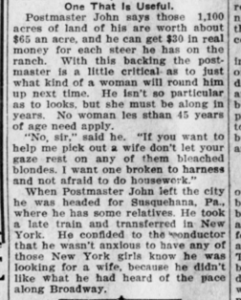
Northern Wyoming Herald, November 10, 1911 (part 2)
In January 1911, Josh filed for divorce in the Park County courts and it was granted later that month. In May 1911, a story appeared in the newspaper that Matilda had been charged as an accomplice in another crime and for attempting to kill her husband with a ranch hand. We are still researching the case, but it was dismissed in Big Horn County back in April since it occurred in the newly formed Park County. In July 1911, the newspapers reported (in a list of court case decisions) that Josh had sued for divorce and was granted it. He was still ranching and in October 1911, he (with five other individuals) shipped 14 cattle cars containing 400 cows from Cody to Omaha. By November 1911, he decided he wanted to remarry and put notices in the paper. In an article entitled “Cross-Continental Search for a Wife by J.W. Dean of Sunshine, Wyoming” in the Northern Wyoming Herald, the listed requirements appeared strenuous:
‘I want a wife. Now don’t you believe for a minute that I am any gold digger, but I want a wife with a little money. I’ve had two wives already, and I had to stake them both….
‘The next one must have a little money – not that I want it, but in case we don’t get along well together I don’t want to have to split my bankroll again…I reckon I would be satisfied if she would have $10,000 or $15,000. That would be enough to get her out of the country in case of a row.’
….With this backing the postmaster is a little critical as to just what kind of a woman will round him up next time. He isn’t so particular as to looks, but she must be along in years. No woman les sthan [sic] 45 years of age need apply…. ‘If you want to help me pick out a wife don’t let your gaze rest on any of them bleached blondes. I want one broken to harness and not afraid to do housework.’
….[on a trip to Pennsylvania] He confided to the conductor that he wasn’t anxious to have any of those New York girls know he was looking for a wife, because he didn’t like what he had heard of the pace along Broadway.
As most women (and hopefully modern men) will understand, it is not much of a surprise that it took three years for someone to take him on this. And the woman who did surprisingly did not meet several of his requirements.
In July of 1912, his house in Sunshine served as the voting place for the settlement and he was on the election committee. September 1912 was the first year that Josh held the Meeteetse Labor Day barbeque.
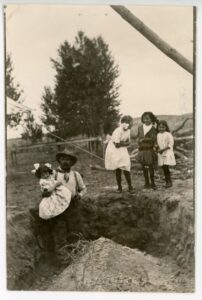
Photograph of Josh holding Grace Steele (later Carlson), with Alice Linton, Mary Steele, and Rosie Linton looking on at one of the barbecues between 1912 and 1915, 2006.0019.0001
In either July 1912 or 1915, Josh served as the barbecue master for an event at Buffalo Bill’s Pahaska, where Buffalo Bill had decided to host a huge dinner for his birthday celebration. Josh received two gifts (a gold medal with Buffalo Bill’s picture on it and a hundred year old watch that belonged to his grandfather) from his old friend that he treasured for the rest of his life.
Josh sold part of his ranch to the May family in either 1913 or 1915, and the sale of his Sunshine ranch, home, and post office to Don Adams occurred in 1915.
He again cooked the barbecue at the Old Timers gathering on Labor Day in September 1914.
In October 1914, he and H.E. Cheeseman shipped four cars of cattle east. It appears he also visited his family in Pennsylvania…and quickly married in early November Miss Rose Winn, who had been visiting his brother and wanted to see the West. He was about 58 and she was about twenty. They immediately returned to Meeteetse and hosted a wedding dance attended by George Hurlbut, who documented the event in his datebook.
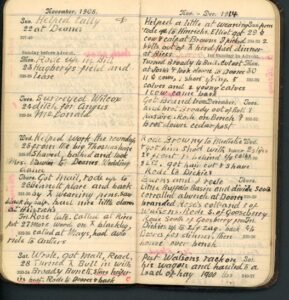
George Hurlbut’s datebook opened to November 1914, Museum collections. The dance was on Wednesday the 25th; George also went to the Deanes’ on Sunday the 22 and Monday the 30th.
By mid-May 1915, Josh served notice in the newspaper that his wife had left and he was no longer responsible for her debts. The next week, it came out in the newspaper that Rose and Josh had made an agreement “it is claimed that she should look after Mr. Dean as long as he lived and fall heir to all he possessed both in properties real and the reputation he had for being a conspicuous character in the land of the Rockies.” In June, the couple were granted their divorce. In July, Josh was in Garland, Wyoming barbecuing and he also barbecued at the Labor Day celebration in September in Meeteetse.
November 1915 saw Josh at farewell dinners because he was selling his Sunshine ranch (and post office) and was taking a trip east. Don Adams, who ended up buying the ranch and post office, was the auctioneer and both he and Josh expected good prices for the sale of items before Josh left. Josh went east and on February 26, 1916, he married for a fourth time to Miss Lillie Siiple, the daughter of a friend of his mother’s. The announcement reached the Basin in March. In April, Josh returned and it was announced that Lillie was to come out west soon.
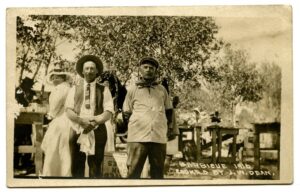
Picture postcards from the 1916 barbecue, 2015.0017.0001 and 2015.0017.0004
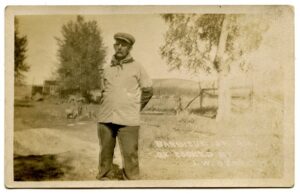
Josh barbecued again at Labor Day before going back to Pennsylvania in October to spend the winter (although not before roasting an ox in Hardin first). He was joining Lillie and it was reported that they might even go spend some time in Florida. The couple didn’t stay as long as originally planned because the newspapers reported in November that they were expected to arrive from Pennsylvania in a few weeks. In December, they bought a Meeteetse restaurant from John Wilson.
Josh barbecued again over Labor Day in 1917 (the August announcement was that “Colonel Josh Deane” will cook the ox). In October, Josh purchased the pool hall while his wife and her sister were in Pennsylvania having received word of a brother’s illness. In a patriotic moment in November, Josh gave notice that he was following food rationing in the restaurant (including no meat on Tuesdays) and planned to donate the New Year’s pool hall proceeds to the Red Cross. In December, Lillie returned from the east and Josh went to Billings to meet her before they both returned to Meeteetse.
They spent January 1918 renovating the restaurant. They also participated in a May 1918 Red Cross auction. In September began the health problems that Josh would face off and on for the rest of his life. In this case, he was only home sick and Georgia Avery filled in at the restaurant.
In March 1919, it was announced “authoritatively” that Josh was critically ill. But he recovered and in May 1919, he went to Billings to meet Lillie’s twin sister, Minnie, who was coming to live with the couple. In June, he went back to Billings to consult a doctor about his ear, since he had been sick off and on recently.
The July 4th 1919 weekend was very busy for the restaurant and its fellow business, the Weller Hotel, thanks to tourists. Josh returned to Billings this month for ear treatment, which he reported was going well. In August, the newspapers announced that Josh would be barbecuing at the Greybull Labor Day celebrations (they were taking a turn from Meeteetse) and the celebrations were being planned by the “Greybull lodge International Association of Machinists.”
In the 1920 census, Josh (63) was living with fourth wife Lillie (44), her twin sister Minnie Siiple, and lodger Gus Hesler. The year 1920 also saw a poem about Josh by local poet “Handsome Harry” B. Madden published. It reads (please excuse the language):
There’s a cafe in Old Meeteetse run on a western plan
And if you’ll kindly listen I’ll tell you of this man.
He is a captain of industry who should be before the screen.
A scout of Uncle Sammy’s his name is John W Deane.
In the long, long, long ago when the golden west was rough
Josh rode into Wyoming midst the redskins wild and tough
And ‘twas many a bloody battle that was fought to tame the west.
And Josh was there and over, he was numbered with the best
You can talk about Kid Carson and the famous Buffalo Bill
But Josh was there like Hitchcock for his gun was sure to kill.
Sure they gentled all the Indians and the horse thieves had to quit
For their guns spoke out defiance for the men behind had grit.
He was a roper and a rider and he done his work with ease.
He packed those old Colt pistols just a bit above his knees.
Where his hand could grab the handle without the loss of time
For in those days seconds counted out in this Western clime.
And we’ll have to give him credit for a brave historic strife
For the gentling of Wyoming and the winning of a wife.
And in future generations it will be our son’s delight
To read from History’s pages of the Old Scout’s noble fight.
April 1920 saw a visit by nephew Herbert McShane, who had recently been introduced to Josh when he was visiting Cody. Herbert had been in the Irma hotel and asked the staff about Josh, who happened to be in the hotel; the two were introduced and the “cordial acquaintance” began.
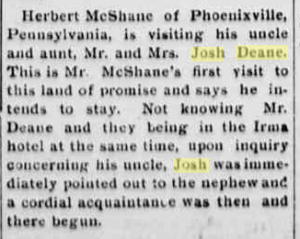
Meeteetse News, April 30, 1920
December 1920 sees the first restaurant ad in the newspapers. Other ads appeared in March, June, and November 1922, and April 1923.
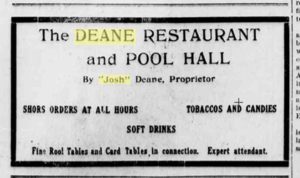
Meeteetse News, March 2, 1920
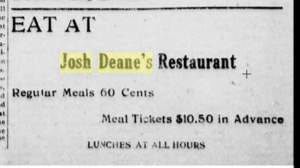
Meeteetse News, December 2, 1922
In March 1921, the Meeteetse News published a report on Josh’s 65th birthday party, which was held at the restaurant with seventeen guests. These guests included his wife Lillie, sister-in-law Minnie Siiple, and nephew Herbert McShane, who actually had the same birthday.
In April 1921, Josh and Lillie were in Billings. Lillie for health recuperation, and Josh for business recuperation. It was announced in July 1921 that a barbecue was planned for a touring auto caravan and Josh was tasked with the barbecuing. That same month, the couple bought the house next to the Episcopal church when the previous owners sold it to go to California. In August, Josh barbecued at the Park County fair with the announcement that it was likely to be his last public barbecue (actually, his last barbecue was the Meeteetse Labor Day celebration in 1925).
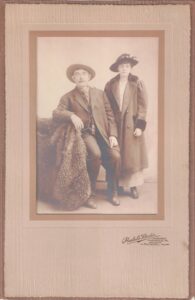
Photograph of Josh and Lillie Deane, c. 1916 – 1930, taken in a Phoenixville, PA studio, 2015.0017.0022
September 1921 through March 1922 was eventful for the family. Sister-in-law Minnie was in a car accident but received only bruises and then the couple (and Minnie) headed east to Pennsylvania for a few months. Lillie got sick and was hospitalized in Philadelphia, which she left in November but their return trip was delayed as she was still healing. In January, it was reported that the family might be staying longer so Josh could share his “Indian” stories as part of a program at the Hippodrome show in New York. In early February, they had made it as far as Billings (after a misfortune in Thermopolis), but then Josh was in the Billings hospital recovering from a serious operation and had not been on screen at the Hippodrome. They returned in late February with the restaurant reopening then; the Meeteetse News reported their (mis)adventures in February and the Enterprise reported in March.
It was announced in April 1922 that Ralph Smith of the Meeteetse News was to marry Josh’s sister-in-law Minnie. In May, Josh was elected Meeteetse’s new mayor in a landslide election. It was reported in June that Josh had visited Cody and “wears his honors modestly.” In July, the couple returned to Billings for Lillie’s health, where Josh shared the news that Meeteetse had a new school and was reporting an oil boom. July also saw the notice that the restaurant was for sale due to health. September saw the marriage between Ralph and Minnie; their return from their honeymoon was reported to be quite rowdy.
Josh and Lillie continued to work at the restaurant, which was renovated inside and a new roof added in January 1923 so the building wouldn’t “leak when it rains.” In April, Josh and Lillie went to Billings for an eye operation for Josh; there was a growth on his eye that was getting treated.
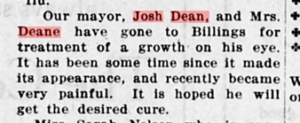
Northern Wyoming Herald, April 18, 1923
The operation must have been successful since in May he was reelected mayor and gave a free dance. July through October saw Josh involved in a court case in Helena, where he was a witness for Swift and Co in the federal court and actually summoned to testify.
In December 1923, the restaurant was refitted with electric lights that were installed by Eugene Phelps. January 1924 saw Josh ill in bed but getting better after two weeks confined to his room. In May, it was announced that Josh would not run again for mayor when they returned from Billings, where Josh had met an “Indian” he knew back in 1874. In July 1924, the couple attended the 4th celebrations in Cody before going on to Billings to stay at the Northern Hotel, where Lillie broke her glasses and had to get them replaced.
August was the announcement of the planned Labor Day celebrations, including Josh’s barbecue. After the celebrations (where F. J. Hiscock took moving pictures), the couple caught the train to Billings at Cody so Lillie could get some dental work done. They were back to work in October. In November, Josh bought the Meeteetse barbecue film, the beginning of his interest and involvement in the film industry; indeed, his obituary several years later described Josh as the owner of the Inland Theater in Meeteetse “in which work he was [still] much interested at the time of death.” The couple planned to spend part of the winter of 1924-1925 in California, likely to research filming. But first, they had to return to Billings for Lillie to consult an eye specialist, where her eyesight was successfully corrected so she was able to see Josh’s “tricks” again. Josh was ill again in November but was able to get back to work.
In February 1925, he arranged to show the barbecue film in Cody before arranging to show it in Billings. The end of the month, two of the Avery girls filled in at the restaurant so Josh could have a rest. Lillie had the flu in March. By April, F. J. Hiscock was making plans to film in Meeteetse, with “mayor” Josh sponsoring. While Josh returned from Billings with Fay Hiscock to film in May, Lillie had recovered from her illness and was home from Mrs. Nelson’s ranch, where she had been recuperating. In June, Josh went to the Antlers ranch with Hiscock to film; it took two tries since the first time they tried it rained.
In September 1925, the movie was completed so Josh began showing it. He was going to show it at Casper and then go east to stay in Pennsylvania. Josh showed the movie before the Labor Day dance in Meeteetse; it was his last barbecue and on September 9, he served the last meal at the restaurant before leaving to show his film in the east. Albert Ward of “Los Vagus” Nevada rented the restaurant in October. Josh’s film “Territorial Days of Wyoming” was shown in Casper in October.
Josh and Lillie did go east and in February 1926, Josh celebrated his 70th birthday; birthday cards should be sent east, the newspapers announced. A recap was printed in April upon their return; they had spent a snowy winter and were planning to show Josh’s film in California in August. Josh and Lillie hadn’t just spent the whole winter in Pennsylvania though; they had also been to Washington DC and New York to show Josh’s film.
In May 1926, the restaurant was leased by Mr. and Mrs. A.E. Hubbard; Josh was suddenly taken sick but was recovering after the doctor was by. Josh seemed to be getting over the restaurant business and focusing on films. In June his picture was shown at the Meeteetse picture house and he acquired the equipment and picture show business from Prof. T.P. Remond. He had improvements to the business made by Henry Sayles; he also installed a new fire escape on the restaurant building. Almost as soon as Josh bought the movie theater, he began putting ads in the newspaper to describe the movies to be shown weekly.
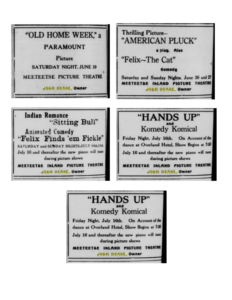
Meeteetse News adverts: June 16, 1926; June 23, 1926; July 7, 1926; July 14, 1926; and July 21, 1926.
In July, he installed a new piano and musical player (they were silent movies at this point so added music was nice). Memoirs of youngsters from this period (1920s) feature Mrs. Deane (Lillie) pounding away at the keys, like this memory by Ed Goodykoontz in the 1980s or 1990s: Josh “would walk through town, ringing a bell and giving the starting time of the movie. Mrs. Dean played the piano, and when there was wild chase with the good guys going after the bad guys in the westersn [sic] of those days she could really pound those keys.”
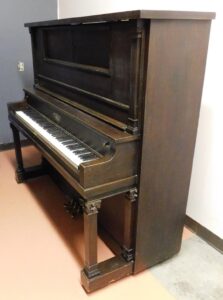
Meeteetse Museums Collections 2017.0005.0001 The piano believed to be used by Mrs. Deane in the silent movie theater, Netzow manufacturer, circa 1900 – 1930, Denver seller name inside
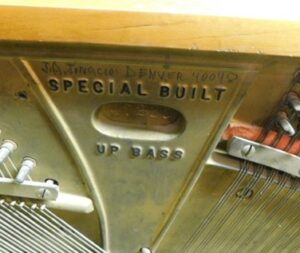
(Above and below) Close up of manufacturer’s label of 2017.0005.0001 piano and of seller’s mark
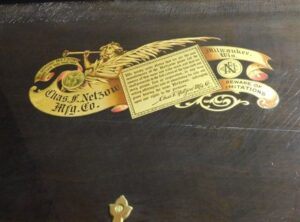
Josh and Lillie went to Denver, from whence they returned in August having bought a (new) moving picture machine (projector). In December, Josh provided a free movie for kids under 14 to entertain them.
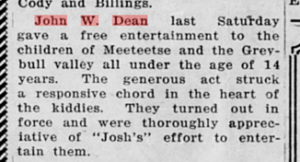
Cody Enterprise & Park County Herald, December 29, 1926
In January 1927, Josh went to Denver with Professor Redmond to continue to learn about films. The next month, Josh and Lillie went to Billings for some fun. In March, they hosted a dance that was a great success.
Despite claims of not running for mayor in years past, Josh was re-elected mayor by a large majority…of course, Josh was also the only ticket for mayor.
Josh and Lillie took a trip to Billings and Hardin in May, returning in June. In June, Lillie was very ill but was getting better after resting comfortably. They returned to Billings in September for the fair and went to Cody in November for visiting and shopping.
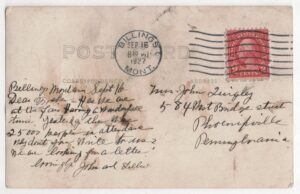
Postcard sent from Billings Fair in September 1927, 2015.0017.0029
In May 1929, Josh was elected mayor for a fifth time and gave a free motion picture show to celebrate.
The 1930 census lists the Deane household as Josh (74), wife Lillie (54), and widowed sister-in-law Minnie Smith (whose husband Ralph died in 1929). The census that year was taken in April and on June 13, 1930, John W. “Josh” Deane died at 6:20am from illness. The official cause on the death certificate is cholecystitis, or gall bladder infection (often caused by gallstones). Survivors included his wife Lillie and brothers GW Deane, CC Deane, and Preston Deane, all of Pennsylvania. After his funeral, his widow put a card of thanks in the newspaper: “I wish sincerely to thank my many friends for their kind expressions of sympathy and for the beautiful floral offerings in my recent bereavement, in the loss of my dear husband. – Mrs. J.W. Deane.”
The Poor Horse Story
Josh had his “what were you thinking?” moments, such as the stories of forgetting the mail or his horse running away with the mail. In this story, Josh should have paid more attention to his gun. He was returning home in late January 1911 when he accidentally discharged his gun…which shot his horse, causing its death several hours later.
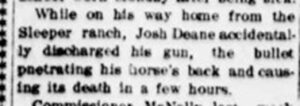
Park County Enterprise, February 1, 1911
Otto Franc’s Pranks
Josh’s friend Otto Franc could be a difficult boss but he also enjoyed playing (mean) pranks. Like the one where he had two men kill and skin a fat old mare “who was of no further use,” hang some of the meat in the meat house, and then the crew ate the “horse steaks for several days, before he told the crowd what we had been eating.” Or when he had the men test an old-fashioned shotgun. No one wanted to actually pull the trigger so they rigged it up in a tree with string on the trigger and pulled: “One barrel went off; the gun flew into a thousand pieces, and riddled the tree. Franc’s only reaction was the cool remark, ‘Well, I’d have been out some help if one of you had shot off that gun.’”
Otto was occasionally on the receiving end of pranks. The pole fences on the ranch angered the bison and one night, Otto heard bison knocking them over; he went out and shot one, crippling it, which only served to anger it and send more poles flying. The poles were flying towards Otto, who jumped onto another fence; the buffalo hooked that section and took Otto and the fence for a short ride.
Otto Franc’s Paranoia
Josh describes Otto as pretty fearless before the Johnson County war with the rustlers. After two men arrested as rustlers were lynched, Otto had a meeting with the guardsmen and other cattlemen which created “a tension in the air that no one could fail to feel.” Indeed, “constant vigilance was exercised against the danger of a surprise attack” by the rustlers’ friends, so much so that Josh discovered 5000 cartridges stored in a wagon.
“The incident seemed to have a permanent ill effect on Otto Franc” and “he became very nervous. He used to have me sleep in his room at night, as a guard.” He was extremely frightened one night by seeing the shadow of a cowboy in the bunk house getting medicine. While Josh liked him, he understood that Otto was a man who was disliked by settlers and small cattlemen and so probably had reason to be afraid. Josh viewed him as an honorable (and discreet) man, although he recognized that Otto could be seen in a different light. After all, “he only told them [his men] to use their judgment and work for his best interests” and never instructed his men to do unlawful things like rustling or killing.
So it seems Otto was right to be paranoid, even if he told Josh “often, during the last years of his life, that he was going to see to it that no one made away with him. He died November 30, 1903, in a manner that had never been explained to the full satisfaction of everyone.” Clearly, Josh wasn’t sure of the official story that Otto’s death was an accident…
Otto’s death was not the only sudden death Josh witnessed; there was one when he was first trailing cattle as a teenager and others during his time at Sunshine. Looking back, he was able to view these deaths philosophically: “Pathetic stories of solitary death…are common enough in all frontier communities. They represent the gambler’s chance a man takes when he chooses the unsettled regions for his home. Doubtless visions of such an end haunted all of us at times, but we managed to keep such thoughts in the background.”
Josh Intimidates a Postal Inspector
About 1890, after Josh’s formal appointment as postmaster, a postal inspector turned up at the Sunshine Post Office. The setup was informal and no regular equipment was provided so beer boxes were repurposed as “very acceptable” post office boxes. Since Josh was still working for Otto Franc, Josh just left the post office unlocked for people to get “their mail from the proper pigeonhole.” Unsure at first how to sell stamps when he wasn’t there, Josh eventually “arranged the difficulty by leaving a sheaf of stamps on the table. The cowboys helped themselves and left their money.” As this was mostly occurring in Josh’s off or spare time, the books were not very accurate and the government reports were sometimes hard to do.
At one point, a stranger came in to check the mail. Josh told him to check his box; the man was horrified that people just helped themselves to the mail and produced his badge, proving himself as the postal inspector. Seeing the books, the inspector realized why there had been so many complaints from headquarters — the math wasn’t adding up! (And no wonder since Josh didn’t believe he’d ever received much of a formal education.) Josh pulled out his gun since “I had taken the office to accommodate my friends, and I was not going to stand for any inspector calling me down, in that superior manner.”
The gun made the inspector more inclined to relax the standards and he instead inquired about the fishing in the area. He returned from fishing (and talking to the neighbors) and taught Josh how to keep the records. The inspector left after a couple of days and when Josh asked when the post office was moving, the inspector told him to keep at it: “‘There will be no more said at headquarters. People around here seem to be satisfied.”
Two years later when there was an inspector in Cody and Meeteetse, the man refused to go see the “pretty tough character” in the Sunshine Post Office.
Of course, Josh had also mostly straightened out the post office by then, receiving the proper equipment and keeping the office in a separate building from his home.
The Park Blew Off…Like I Predicted
In October 1923, some smoke from north was seen in Meeteetse. Mail and parcel post carrier Joe Wolf was interrogated when he came into Meeteetse by anxious citizens. Joe declared with a straight face “‘the top of the Park blew off.’ ‘There!’ declared Mayor Josh Deane when he heard the news. ‘Havn’t [sic] I always said it would?’”
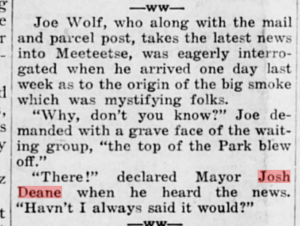
Cody Enterprise, October 17, 1923
Josh Deane Day
In April 1952, the first Josh Deane day occurred in Cody to bring Cody and Meeteetse closer. The recap in the newspaper the first year declared that “The day was sponsored by the Cody club to honor one-time Meeteetse mayor, barbeque king, mail rider and most of all, story teller.” The Josh Deane Days were held for several years in April and May and included parades, a Josh Deane reenator, roping contests, dinners, dances, and silent auctions. The first year’s benefit auction brought in $1043 to be put into the swimming pool drive.
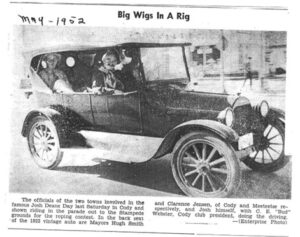
Photocopy in the Museum Archives
Maybe we should think about reviving it?
As you can see, Josh Deane lived on long after he died. The Cody/Park County Enterprise declared in May 1955 that “Josh Deane died twenty-two years ago [twenty-five actually], but he is still Meeteetse’s most famous institution.” Friends and those who knew him declared in the article that “‘You never could tell when Josh was lyin’ and when he was tellin’ the truth.’” Josh lived life to the fullest, enjoyed telling history, stories, and tall tales, and loved to entertain whether with films or barbecue. As we prepare to celebrate the annual Labor Day festivities in Meeteetse, enjoy them (safely!) in a way Josh Deane would approve of.

